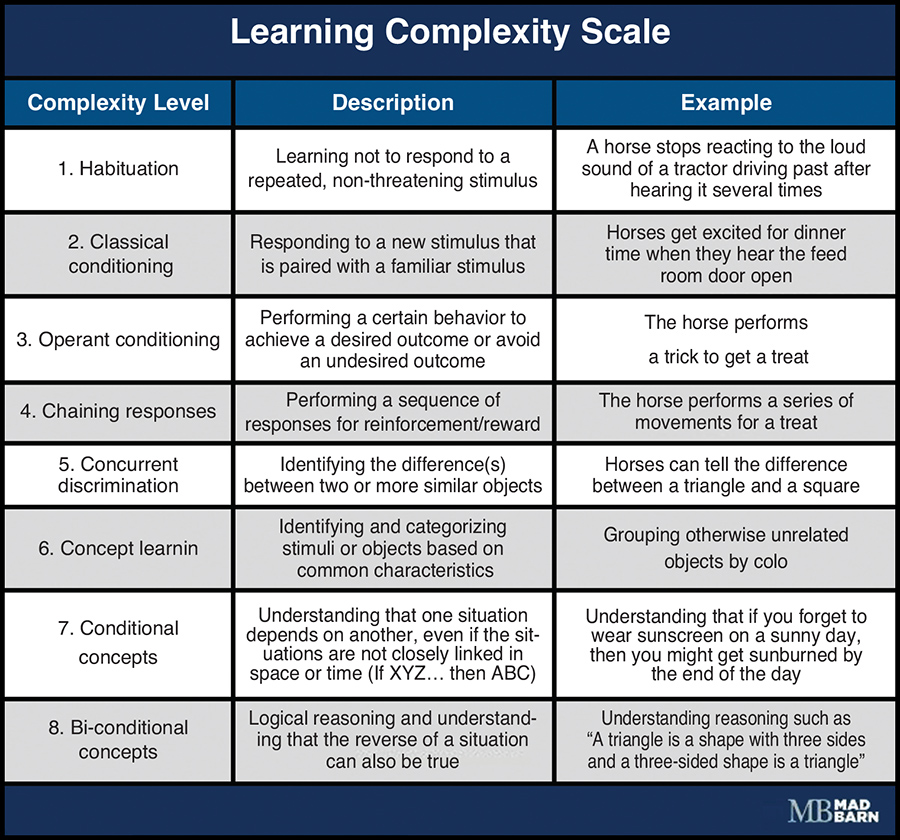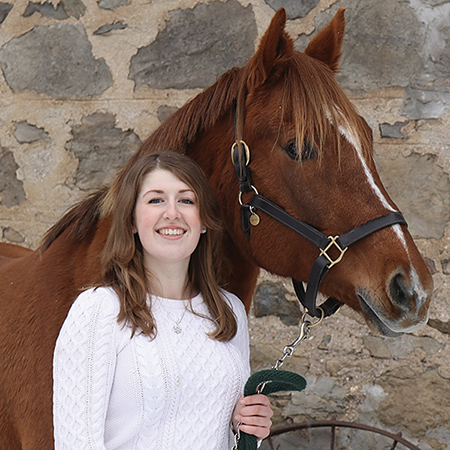
With proper training, horses can be taught to do all sorts of incredible things.
By Caleigh Copelin, BBRM (Honours), PhD Candidate
As Canada’s leader in equine nutrition, Mad Barn thanks The Rider for featuring this story. To read the full version of the article, visit https://madbarn.ca/equine-learning-theory/.
With proper training, horses can be taught to do all sorts of incredible things. Successfully teaching a horse a new skill requires owners and trainers to understand how horses learn.
Many common training methods go against the principles of equine learning theory, which describes how the horse’s brain works during learning. With controversy surrounding certain methods, it can be hard to know which is most effective and humane for your horse.
Read on to learn about our current understanding of the mental framework of how horses learn and factors that influence learning in your own training practices.
What is Learning Theory?
Learning theory is a framework that describes how animals absorb, process and retain information when they are learning. These processes can be influenced by cognitive, emotional and environmental factors, as well as past experiences with learning and training.
Motivation, Stress & Distress in Learning
Motivation has a significant impact on how quickly and effectively a horse learns.
When motivation levels are too high, the horse may become stressed or frustrated if they can’t find the answer quickly, which can distract them from further learning. However, a horse who is not motivated will also learn poorly, since they don’t have any desire to engage with the task at hand.
Optimal learning often occurs when motivation is balanced enough to engage the horse but not enough to cause distress. In some cases, this state can involve eustress, or ‘positive stress,’ which helps drive focus and problem-solving without overwhelming the horse. Mild levels of positive stress can push the horse to try new behaviors and look for answers to their trainer’s questions, helping them learn more effectively.
However, trainers must be careful not to push their horse past stress thresholds and into a state of distress (negative stress). Distress causes fear and anxiety, which reduces learning ability. Trainers should consider the individual personality and needs of their horse when developing a training program and adjust plans if necessary.

Learning Abilities of the Horse
Learning abilities can be broken down into eight "levels," ranked from least to most complex:
Horses have reliably demonstrated learning abilities up to the level of concurrent discrimination (level 5/8). Some preliminary research suggests that horses may be capable of concept learning (level 6/8), though other studies suggest horses use simpler mental processes to achieve the same result as concept learning. There is no scientific evidence that horses can understand conditional or bi-conditional concepts (levels 7 and 8).
Types of Learning
The ways horses learn can be divided into two categories: non-associative and associative learning. Both types of learning can be active and passive processes.
Non-associative learning changes a horse’s level of reaction to one stimulus (e.g., a sight, sound, object or experience). This category includes habituation and sensitization.
Associative learning creates mental links between stimuli and behavioral responses. This category includes classical and operant conditioning, which are defined as:
• Operant Conditioning: Behaviors are influenced by the consequences that follow them, such as rewards or punishments.
• Classical Conditioning: A neutral stimulus becomes associated with a naturally occurring stimulus, eventually eliciting a similar response on its own. The most famous example of classical conditioning is "Pavlov’s Dog," where the researcher (Pavlov) conditioned dogs to salivate at the sound of a bell.
Learning, Training & Equine Welfare
It’s important to take a horse’s intelligence and learning abilities into account when training. For learning theory to be applied effectively in training, it must be tailored to the individual horse.
Factors that Influence Learning & Training
Just like people, every horse is unique. There are many individual factors that influence how easily a horse learns, including:
• Individual learning ability: Some horses naturally learn faster than others. Genetics may play a role in determining equine cognitive capabilities and overall intelligence.
• Trainer knowledge and skill: Trainers whose cues and reinforcements are clear, consistent and properly timed provide an optimal learning environment.
• Horse personality: Recent studies suggest that a horse’s personality can affect both how well the horse learns and the mental processes that the horse uses to learn.
• Horse conformation and physical ability: A horse’s highest possible level of training is often determined by physical traits. A horse with atrophied muscles or very poor conformation may never be able to perform physically challenging movements, regardless of how smart and trainable they are.
• Horse health and soundness: Illness and injury can cause discomfort, stress and distraction, which may make it harder for a horse to focus and learn. Soundness issues can also limit a horse’s physical capabilities, hindering some training possibilities.
• Horse history: Horses who are traumatized or unfamiliar with humans may find training stressful or frightening, making it harder for them to learn.
• Overall management: The horse’s major welfare needs are free movement, foraging opportunities and socialization with friends, sometimes referred to as the 3 Fs. Horses who do not have sufficient access to these opportunities may not learn as effectively as those receiving appropriate management.
• Equine emotional state: Fear, frustration, or excitement can significantly impact a horse’s ability to learn. A horse that is fearful may struggle to focus on a task, while a horse that is calm and relaxed may be more open to learning.
• Control and predictability: Horses feel more secure and focused when they can anticipate outcomes, which helps reduce distress, frustration, and boosts motivation. Clear, consistent cues and a stable environment provide predictability for the horse, which leads to effective learning.
Finally, the horse’s training environment can also influence learning. Training in unfamiliar, isolated areas could cause a horse to be afraid or reactive, negatively impacting their learning. Conversely, training in familiar, open areas can promote relaxation and have a positive impact on learning.
 About the Author: Caleigh Copelin holds a BBRM (Honours) in Equine Management and is currently a PhD candidate in Equine Behaviour and Welfare at the University of Guelph. Her current research aims to identify management practices that can help reduce stress in riding lesson horses. Outside of her research, Caleigh is also the Honorary Secretary and a Trustee for the International Society for Equitation Science, a scientific society that works to help translate equitation science research findings into practice in the horse industry.
About the Author: Caleigh Copelin holds a BBRM (Honours) in Equine Management and is currently a PhD candidate in Equine Behaviour and Welfare at the University of Guelph. Her current research aims to identify management practices that can help reduce stress in riding lesson horses. Outside of her research, Caleigh is also the Honorary Secretary and a Trustee for the International Society for Equitation Science, a scientific society that works to help translate equitation science research findings into practice in the horse industry.
Source: MadBarn


